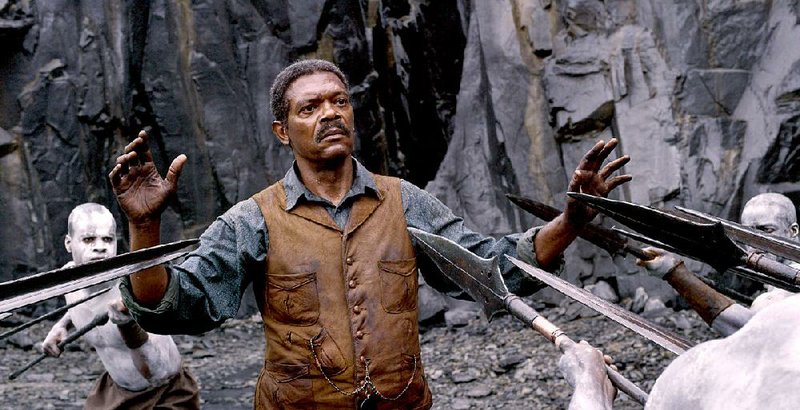Once, besides being lord of the jungle, Tarzan also ruled America's pop culture landscape.
Following his introduction in 1912 by author Edgar Rice Burroughs, Tarzan appeared in books, movies, radio serials, TV shows, cartoons and comic books. He had his own brand of bread; his own line of swimsuits; there was even Tarzan gasoline.
English professor Russel Nye, a pioneer of pop culture theory who also won a Pulitzer Prize, said in the early 1970s that "Tarzan remains the greatest popular creation of all time" in America.
That was once.
After countless depictions of Tarzan in pop culture, including a dozen movies in the 1930s and 1940s with gold medal-winning Olympian Johnny Weissmuller as the lead, the last major motion picture showcasing the character -- not counting Disney's 1999 animated movie, Tarzan -- was 1984's Greystoke: The Legend of Tarzan.
The former king of American pop culture has fallen upon hard times. So low has he fallen, in fact, that his most noteworthy appearance of late is as a bumbling idiot getting lost in his jungle while swinging from vine to vine in an insurance commercial.
Even his stalwart love interest, Jane, mocks him in the advertisement.
Tarzan's status as heroic pop culture icon has been replaced by the Batmans, Supermans and Iron Mans of the world.
Perhaps Tarzan's fortunes are about to turn, though. Recently, for the first time in 32 years, Tarzan returned to theaters in The Legend of Tarzan, a bona fide potential summer blockbuster with a $180 million production budget, according to Box Office Mojo.
Starring Alexander Skarsgard of True Blood fame as Tarzan, aka John Clayton III, Lord Greystoke, the film also stars Margot Robbie (The Wolf of Wall Street, the forthcoming Suicide Squad) as Jane Porter, along with Oscar winners or nominees Christoph Waltz, Samuel L. Jackson, Djimon Hounsou, John Hurt and Jim Broadbent.
The film follows Tarzan -- living an aristocratic life as Greystoke in the United Kingdom -- as he travels back to Africa, where the action unfolds.
Much has been written about Tarzan over the decades, but it's at Hendrix College in Conway where one finds a leading Tarzan academic in English professor Alex Vernon, who first started teaching Tarzan's debut, Tarzan of the Apes, in his American literature and the environment class.
Vernon, who earned a bachelor's degree from the U.S. Military Academy and a master's and doctorate from the University of North Carolina, also has published a book about Tarzan, 2008's On Tarzan. University of Georgia Press describes the book as "a sometimes playful, sometimes serious, and always provocative consideration of the 20th century's best-known fictional character. It is also the first book-length investigation of a century's worth of Tarzan's incarnations and our varied imaginative responses to them."
Last month, Vernon talked at length about how and why Tarzan has held the public imagination for so long and what the future holds.
Q: What is the appeal of Tarzan that has kept him around for 104 years now?
A: "That's what my 300-page book is about. That question. I did the math once -- and this isn't even really good math but really conservative -- but between the first film version in 1918 and 1970, there was a Tarzan feature film every 14 and a half months. That's really conservative because it doesn't include all the foreign versions of Tarzan or the Tarzan ripoffs. The original Tarzan movies were all serial, as many films were back then. So, one every 14 and a half months until 1970 and then nothing till one with Bo Derek in 1981 and Greystoke in 1984 and then 1984 until 2016. Sure, there were some television things and movies, but no major motion pictures. Nothing since 1984, which is really fascinating."
Q: What in 1912 brought Tarzan into being?
A: "We are still, essentially, the first generation after Darwin's On the Origin of Species, basically. There's that question of what is the difference between humans and apes. ... That's one of the big struggles.
"Also, at that time in America, we are moving inside. We are getting office jobs and moving into cities. Around the same general era that we are discovering we have animal roots, we're also leaving that environment behind and going indoors. You've got that conflict of being more civilized and more animal at the same time. That's the Tarzan issue. There are a thousand more issues."
Q: How many times has Tarzan been depicted in pop culture?
A: "Countless. Honest to God. There are so many feature films just in America and several television series and several animated series. Then all the foreign versions of Tarzan and all the ripoff versions of Tarzan. The faux Tarzans. There are various comic book versions. Radio show versions. Games. Burroughs was the first American writer to incorporate himself in 1920-something. When we think of movie character franchises now, where all the products are on the shelves before the movie's out, he started that. ... He was really the first person to make that popular entertainment franchise with all sorts of spinoffs."
Q: Do you think the appeal of Tarzan has fallen off in the past few decades?
A: "I always talk to my students and ask them who's read Tarzan before. In 15 years of teaching this book, one person raised their hand. Most of them have seen the Disney film, but in terms of reading the books, they just don't do it anymore. I feel as though the appeal has fallen off. ... Everyone still knows the story regardless of whether you've read anything or seen the movies, but the appeal has also diminished radically.
"I think a lot of the appeal of 1912 and what was going on in American culture and society at that time -- we've just moved a lot farther from those issues that were facing us at that time."
MovieStyle on 07/08/2016


